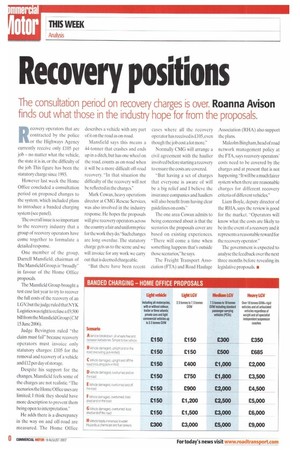Recovery positions
Page 20

If you've noticed an error in this article please click here to report it so we can fix it.
The consultation period on recovery charges is over. Roanna Avison finds out what those in the industry hope for from the proposals.
Recovery operators that are contracted by the police or the Highways Agency currently receive only £105 per job — no matter what the vehicle, the state it is in, or the difficulty of the job. This figure has been the statutory charge since 1993.
However last week the Home Office concluded a consultation period on proposed changes to the system, which included plans to introduce a banded charging system (see panel).
The overall issue is so important to the recovery industry that a group of recovery operators have come together to formulate a detailed response.
One member of the group, Darrell Mansfield. chairman of The Mansfield Group. is" broadly" in favour of the Home Office proposals.
The Mansfield Group brought a test case last year to Lry to recover the full costs of the recovery of an LGV, but the judge ruled that NYK Logistics was right to refuse a9,500 bill from the Mansfield Group (CM 15 June 2006).
Judge Bevington ruled "the claim must fail" because recovery operators must invoice only statutory charges: 1105 for the removal and recovery of a vehicle and £12 per day of storage.
Despite his support for the changes. Mansfield feels some of the charges are not realistic. "The scenarios the Home Office uses are limited; I think they should have more description to prevent them being open to interpretation.
He adds there is a discrepancy in the way on and off-road are measured. The Home Office describes a vehicle with any part of it on the road as on-road.
Mansfield says this means a 44-tonner that crashes and ends up in a ditch, but has one wheel on the road, counts as on-road when it will be a more difficult off-road recovery. "In that situation the difficulty of the recovery will not be reflected in the charges."
Mark Cowan, heavy operations director at CMG Rescue Services, was also involved in the industry response. He hopes the proposals will give recovery operators across the country a fair and uniform price for the work they do."Such changes are long overdue. The statutory charge gets us to the scene and we will invoice for any work we carry out that is deemed chargeable.
"But there have been recent cases where all the recovery operator has received is £105,even though the job cost a lot more.
Normally CMG will arrange a civil agreement with the haulier involved before starting a recovery to ensure the costs are covered.
"But having a set of charges that everyone is aware of will be a big relief and I believe the insurance companies and hauliers will also benefit from having clear guidelines on costs."
The one area Cowan admits to being concerned about is that the scenarios the proposals cover are based on existing experiences. "There will come a time when something happens that's outside those scenarios," he says.
The Freight Transport Association (FTA) and Road Haulage Association (RI-IA) also support the plans.
Malcolm Bingham, head of road network management policy at the ETA, says recovery operators' costs need to be covered by the charges and at present that is not happening.-It will be a much fairer system when there are reasonable charges for different recovery criteria of different vehicles.
Liam Boyle, deputy director of the RHA, says the review is good for the market. -Operators will know what the costs are likely to be in the event of a recovery and it represents a reasonable reward for the recovery operator."
The government is expected to analyse the feedback over the next three months before revealing its legislative proposals.






















































































































































































